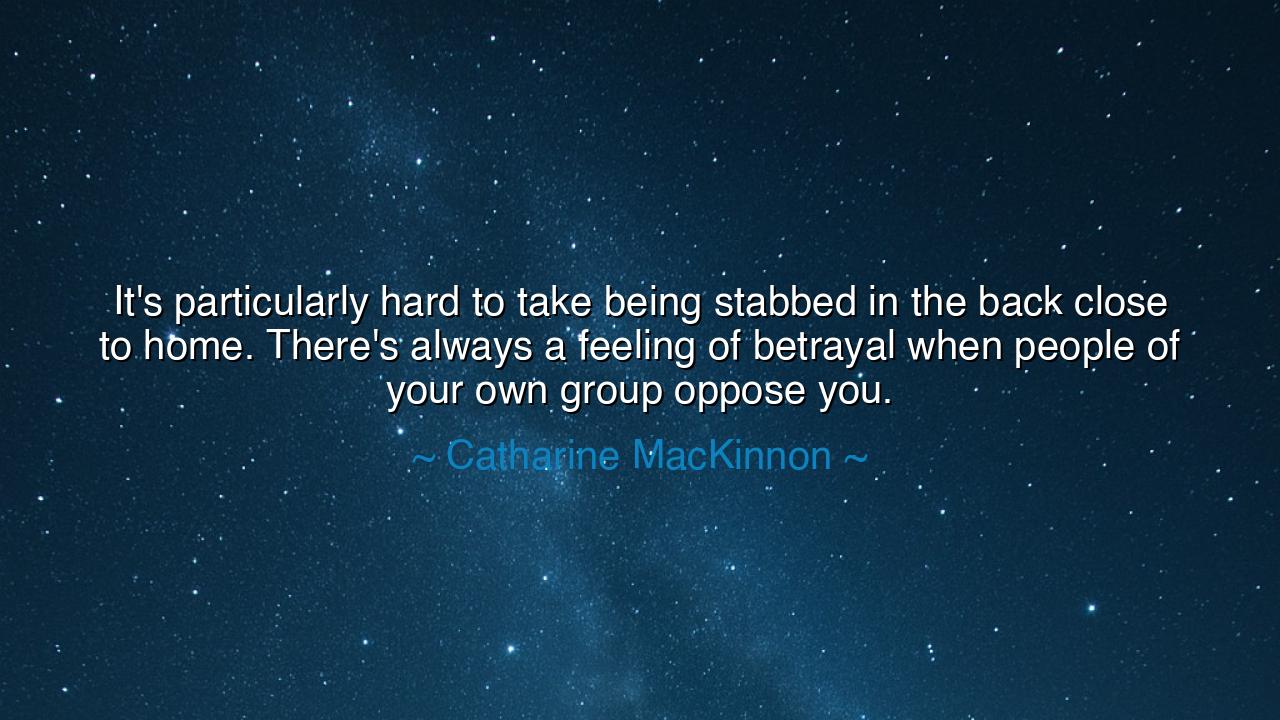
It's particularly hard to take being stabbed in the back close to
It's particularly hard to take being stabbed in the back close to home. There's always a feeling of betrayal when people of your own group oppose you.






In the powerful words of Catharine MacKinnon, a scholar and warrior for justice, we hear the sting of truth that has haunted every generation: “It’s particularly hard to take being stabbed in the back close to home. There’s always a feeling of betrayal when people of your own group oppose you.” These words cut deep because they reveal a wound that all who strive for truth and righteousness must one day face—the wound not from enemies, but from friends, allies, and those who should have stood beside us. Betrayal from the outside is expected, but betrayal from within strikes at the core of the soul. It is the breaking not of flesh, but of faith.
To be “stabbed in the back” is not merely to be opposed, but to be betrayed by trust itself. The ancient philosophers understood that loyalty is sacred because it binds hearts as well as causes. When that bond is broken by one who shares our blood, our beliefs, or our battles, the pain becomes heavier than any open conflict. For an enemy’s blade wounds the body, but a friend’s betrayal wounds the spirit. MacKinnon, in her long struggle for the equality of women, knew that resistance often came not only from the powerful who opposed her cause, but from those within her own circles—those who shared her identity, her suffering, and yet turned against her. Such pain is profound because it comes wrapped in the cloak of familiarity.
The ancients recorded such betrayals in story and scripture so that we might remember their lessons. Consider Julius Caesar, struck down not by foreign foes, but by his own senate, his own kin of power. When he saw Brutus, whom he loved like a son, among his assassins, his final words—“Et tu, Brute?”—were not of anger, but of disbelief. He could face the knives of Rome’s politics, but not the knife of affection turned cruel. So too does MacKinnon’s lament echo this eternal cry: that the sharpest wounds are inflicted not by strangers, but by those we once trusted to guard our backs.
In this, there lies a universal truth about human struggle. Whether in politics, movements, friendships, or families, opposition from within the fold feels like a cosmic injustice. We ask ourselves, “If even my own turn against me, who then is left to trust?” And yet, such trials are the crucible of purpose. They strip away illusions and reveal the pure heart of conviction. When those close to us betray us, we are left standing alone—and it is in that solitude that true strength is born. The soul, once betrayed, learns to stand not on the approval of others, but on the foundation of principle.
MacKinnon’s words also speak to the loneliness of leadership and conviction. For those who challenge systems of power, opposition from outside is natural—but dissent from within wounds most deeply because it carries the weight of disappointment. Those who have endured such inner betrayal—whether prophets, reformers, or thinkers—have always stood as outcasts among their own. Think of Galileo, condemned by his church for revealing the truths of the stars; or Socrates, executed by his city for questioning its wisdom. Both loved the communities that condemned them, and both bore their punishment with sorrow rather than hatred. Their betrayal was the price of seeing further than those around them.
And yet, even in betrayal there is a hidden grace. For those who are betrayed close to home are given the chance to learn compassion without illusion. They see the weakness of humanity and understand that even the well-meaning can falter. The wise do not harden in bitterness—they strengthen in clarity. Forgiveness, though not immediate, becomes the act that restores the soul’s dignity. For to forgive a traitor is not to excuse them, but to free oneself from their shadow. The betrayed who still love humanity rise higher than those who never trusted it at all.
The lesson, then, is this: do not despair when betrayal finds you—it is a test of truth, not a measure of failure. When those closest to you turn away, do not let your heart follow them into bitterness. Stand firm in what is right, even when the crowd grows thin. Remember that all great builders, all reformers, all lovers of justice, have walked this path before you. When your own rise against you, know that you are treading the narrow road of integrity, where only the brave endure.
So, dear listener, when you are betrayed by your own, take heart. The sting of the knife will fade, but the strength it leaves behind will not. Let it refine you, not ruin you. For betrayal close to home is not the end of faith—it is the beginning of wisdom. It teaches you to place your trust not in shifting loyalties, but in the eternal values of truth, compassion, and courage. And when you have endured it, you will walk not as one wounded, but as one awakened—proof that even from the deepest cut, the heart can rise unbroken.






AAdministratorAdministrator
Welcome, honored guests. Please leave a comment, we will respond soon